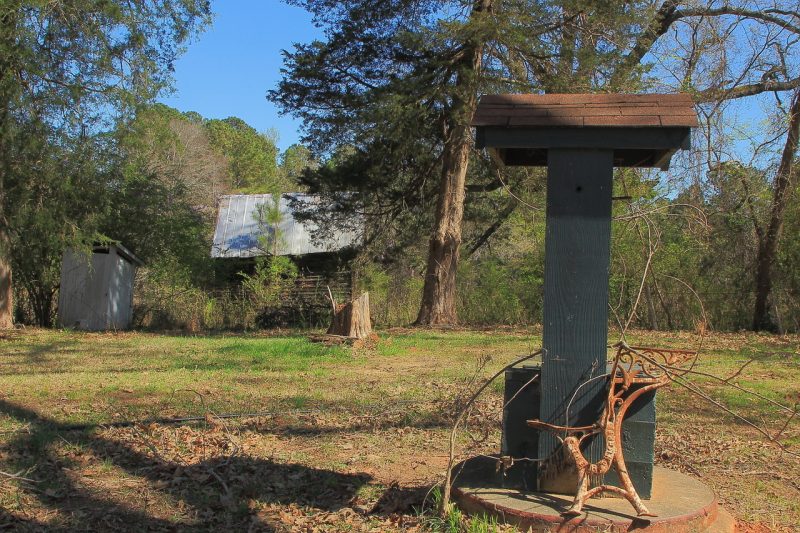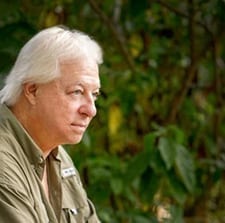The Home Place
April 19, 2023By Tom Poland
It’s a scene Normal Rockwell would have liked. We see an old hand-dug well, a corncrib, and an outhouse. A fine old cedar leans back as if taking a gander at my camera and me. We time travel here where a glorious vestige of the glorious past lingers. Why there’s even the skeletal frame of an old school desk propped against what seems a wishing well, and what do I wish for? A return to simpler times.
In forays throughout my Southland of back roads, I come across remainders of simpler times. I find a lot of joy in them. How uplifting to see the daffodils, snowdrops, and irises the farmer’s wife planted. How sweet to see the girl’s crumbling dollhouse. Of course, I see sadness too. Abandoned churches, their pews decaying, a farmhouse leaning, leaning, leaning until that one blast of wind arrives. Who will be around to hear its final groan? Nary a soul I wager.

Back to my Norman Rockwell scene. You’ll note a long black hose crossing the grass. But, what you don’t see speaks volumes. No power lines. No litter. No asphalt. (You will see the well’s fairly new asphalt shingles, but I’ll give those a pass.) No vinyl siding, a curse if ever there was. No security sign to ward off interlopers and those who do their dirty work in the wee hours.
Three icons from the past—a stately outhouse rendered white, a corncrib with its longleaf pine and tin, and an old well lovingly cared for, safe, and attended by the remains of an old desk. All of which, the cemetery tree, that aged cedar, prevails over.
I’ve written about these things before. What’s that? You say I’ve never written about a corncrib before? Well, yes, I have. I have an old longleaf pine kitchen table that around 1810 was a corncrib. I’ve covered it in my journals. Outside of rocks and me, it’s the oldest thing in my home.
And outhouses I’ve written about many a time. Remember this?
“Georgia writer Harry Crews remembers the outhouse. In the minds of most people, the Sears, Roebuck catalogue is a kind of low joke associated with outhouses. God knows the catalogue sometimes ended up in the outhouse, but more often it did not. All the farmers, black and white, kept dried corncobs beside their double-seated thrones, and the cobs served the purpose for which they were put there with all possible efficiency and comfort.”
Well, now. That old corncrib sure is close by the outhouse. Coincidence or convenience? I’ll let you decide. (I tried to open the outhouse door, but vines as thick as pencils held it tight. Might there be a Sears catalogue inside? Perhaps another trip will yield the answer.)
And of course I’ve written about hand-dug wells. Perhaps some of you will recall these words: “My family home had a hand-dug well, and as a boy I’d peer into it and see water trickling in from the east. To this day, hand-dug wells intrigue me. Classify them as an older way of living and file them alongside plowing with mules and smoking hams in a smokehouse. In the last four years, I’ve stumbled across four. One sits in woods in Greenwood County, and one hides in vines at my grandmother’s home place. Another sits near an abandoned shack in Edgefield County. The fourth well hides in periwinkle near the site of Badwell Plantation in McCormick County.”
Since that writing I’ve come across other hand-dug wells and a fellow told me of a place where no less than thirty hide in vines. “Watch your step,” he said. Watch my step, indeed.
Yes, I like this photo of an old home place and how it hearkens back to simpler times. I just might render it black and white and add a touch of sepia for that old authentic touch. Maybe I’ll make a print and hang it on the wall as a reminder of how our predecessor made do when times were no doubt harder, but simpler.
Georgia native Tom Poland writes a weekly column about the South, its people, traditions, lifestyle, and culture and speaks frequently to groups in the South. Governor Henry McMaster conferred the Order of the Palmetto upon Tom, South Carolina’s highest civilian honor, stating, “His work is exceptional to the state.” Poland’s work appears in books, magazines, journals, and newspapers throughout the South.
Visit Tom’s website at www.tompoland.net
Email him at [email protected]















